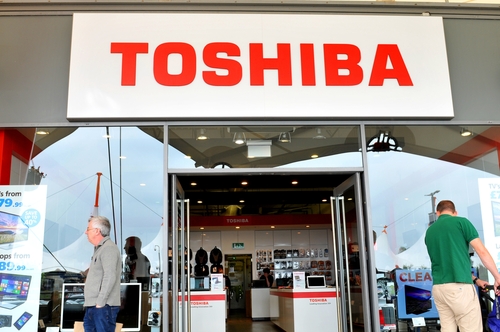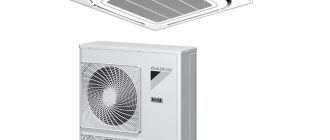
Is Toshiba owned by Midea?
The ownership of Toshiba has always been a subject of interest and speculation in the business world. One of the main questions that arise is whether Toshiba is owned by the Chinese appliance manufacturer, Midea.
Toshiba, a renowned Japanese conglomerate, is known for its diverse range of products, including electronics, home appliances, and industrial equipment. On the other hand, Midea is a Chinese company that specializes in producing household appliances, such as air conditioners, refrigerators, and washing machines.
Despite the similarities in their product offerings, it is important to note that Midea does not own Toshiba. The ownership structure of Toshiba is complex, with various stakeholders and investors involved. While Midea may be a competitor in the appliance industry, it does not have any controlling stake or ownership in Toshiba.
Understanding the ownership structure of a company like Toshiba is crucial for investors and consumers alike. By exploring the ownership details, we can gain a better understanding of the corporate governance and decision-making processes within the company. Although Midea may have a significant presence in the appliance industry, it does not currently have any ownership ties to Toshiba.
Toshiba’s Ownership History: A Brief Overview
Toshiba, a renowned and long-standing Japanese multinational conglomerate, has had an interesting ownership history throughout its existence. While it is not owned by Midea, a Chinese home appliances manufacturer, there have been notable changes in Toshiba’s ownership structure over the years.
Founded in 1875, Toshiba started as a telegraph equipment company and gradually expanded into various sectors, including electronics, semiconductors, nuclear energy, and more. Throughout its journey, Toshiba underwent several ownership transitions and encountered significant milestones.
In 1939, Toshiba was established as a separate entity, separating from the merger between Shibaura Engineering Works Co., Ltd., and Tokyo Electric Company. Over the years, Toshiba expanded its operations globally, becoming a prominent player in the technology industry.
Fast forward to the early 21st century, Toshiba faced financial challenges due to accounting scandals and the global economic downturn. In 2017, Toshiba sold its highly profitable NAND flash memory business to a Bain Capital-led consortium, which included companies like Apple and SK Hynix, to raise funds and stabilize its finances.
While Toshiba is a independent company, Midea, a Chinese electrical appliances manufacturer, has acquired a significant stake in Toshiba’s home appliances business. In 2016, Midea bought a 80.1% controlling interest in Toshiba Lifestyle Products & Services Corporation, which included Toshiba’s white goods business.
| 1939 | Toshiba established as a separate entity |
| 2017 | Sold NAND flash memory business |
| 2016 | Midea acquires controlling interest in Toshiba’s home appliances business |
Despite these developments, Toshiba remains a well-known and respected brand in the technology industry, producing a wide range of electronic devices and providing innovative solutions to its customers.
Midea’s Entry into Toshiba: How Did It Happen?
In recent years, there has been a significant development in the ownership of Toshiba, a well-known Japanese multinational conglomerate. Midea, a Chinese electrical appliance manufacturer, has made its way into the picture.
The entry of Midea into Toshiba began in 2016 when the Chinese company acquired a stake in Toshiba’s home appliance business. This move allowed Midea to gain a foothold in the Japanese market and expand its global reach.
The acquisition was a strategic move for Midea, as it aimed to tap into Toshiba’s expertise in the home appliance industry, particularly in areas such as refrigerators and washing machines. Toshiba, on the other hand, benefited from the partnership by gaining access to Midea’s manufacturing capabilities and distribution network in China.
This entry into Toshiba was not without its challenges. Midea faced resistance from some stakeholders in Japan who were concerned about the acquisition of a major Japanese company by a foreign entity. However, after a series of negotiations and approvals, the deal was finalized.
Since Midea’s entry into Toshiba, the two companies have been working together to strengthen the brand and develop innovative products. The partnership has allowed Toshiba to leverage Midea’s technology and resources to continue its growth in the global market.
Overall, Midea’s entry into Toshiba has been a significant development in the ownership of the company. It has opened up new opportunities for both companies to expand their market presence and collaborate on future projects. The partnership between Midea and Toshiba showcases the increasingly global nature of business and the importance of strategic alliances in today’s competitive market.
Toshiba’s Financial Crisis and the Need for Investment
Toshiba, a renowned Japanese multinational conglomerate, has been facing a significant financial crisis in recent years. The company’s troubles began in 2015 when it was discovered that Toshiba had overstated its profits by $1.2 billion over a period of several years. This scandal led to the resignation of top executives and a damaging blow to the company’s reputation.
In order to overcome this financial crisis, Toshiba has been in need of substantial investment. This is where Midea, a Chinese home appliances manufacturer, comes into play. Midea took a keen interest in Toshiba and saw an opportunity to invest in the company. In 2016, Midea acquired a stake in Toshiba’s home appliances business, which allowed them to strengthen their position as a major player in the global market.
Toshiba’s financial crisis highlighted the urgent need for investment to stabilize the company and regain its competitive edge. The investment from Midea not only injected much-needed capital into Toshiba but also brought new expertise and resources to the table. Midea’s knowledge and experience in the home appliances industry have helped Toshiba to improve its operations and regain customer trust.
Furthermore, the investment from Midea has allowed Toshiba to diversify its product offerings and explore new opportunities in emerging markets. This has helped the company to expand its customer base and reduce its dependence on traditional markets, which were hit particularly hard during the financial crisis.
In conclusion, Toshiba’s financial crisis necessitated significant investment to ensure its survival and future growth. The partnership with Midea has proven to be beneficial for both companies, with Toshiba receiving much-needed support and Midea gaining a stronger foothold in the global market. As Toshiba continues to recover from its financial difficulties, the investment from Midea will play a crucial role in shaping the company’s future success.
Midea’s Initial Investment in Toshiba: A Strategic Move
In the ever-changing landscape of corporate ownership, the relationship between Midea and Toshiba has come under scrutiny. Many have wondered if Toshiba is owned by Midea, and the answer is complex.
Midea’s initial investment in Toshiba was indeed a strategic move. In 2016, Midea, a Chinese electrical appliance manufacturer, acquired a controlling stake in Toshiba’s home appliance business. This move allowed Midea to gain access to Toshiba’s renowned brand name, advanced technology, and extensive distribution networks.
Midea’s investment in Toshiba was not solely driven by the desire to own the company entirely. Instead, it was a strategic move to leverage Toshiba’s assets and establish a strong foothold in the global market. By partnering with Toshiba, Midea was able to expand its product offerings and enhance its competitiveness in the competitive home appliance industry.
While Midea does hold a significant stake in Toshiba’s home appliance business, it does not fully own Toshiba as a whole. Toshiba remains an independent, multinational conglomerate that operates in various industries, including energy, infrastructure, and electronics.
The partnership between Midea and Toshiba has proven to be beneficial for both companies. Midea has gained access to Toshiba’s expertise and assets, while Toshiba has benefited from Midea’s financial support and global reach.
In conclusion, Midea’s initial investment in Toshiba was a strategic move aimed at leveraging Toshiba’s assets and expanding Midea’s presence in the global market. While Midea holds a controlling stake in Toshiba’s home appliance business, Toshiba remains an independent multinational conglomerate. The partnership between Midea and Toshiba has proven to be mutually beneficial, allowing both companies to thrive in their respective industries.
Understanding Midea’s Stake in Toshiba
Toshiba, a Japanese multinational conglomerate, has a complex ownership structure that involves various companies and entities. One of these entities is Midea, a Chinese home appliances manufacturer.
Midea has a notable stake in Toshiba, but it does not own the entirety of the company. As of the latest available information, Midea holds a significant minority stake in Toshiba. This means that Midea has a substantial ownership interest in Toshiba, but it does not have full control over the company.
The relationship between Toshiba and Midea can be traced back to 2016 when Midea acquired a 80.1% stake in Toshiba’s home appliances division. This deal allowed Midea to expand its business and gain access to Toshiba’s technology and brand reputation. However, Midea’s ownership is limited to the home appliances division of Toshiba, and it does not extend to other sectors of the company.
Midea’s investment in Toshiba has been seen as a strategic move to enhance its global presence and strengthen its position in the home appliances market. The partnership between the two companies has resulted in collaborative efforts in research and development, manufacturing, and distribution.
It is important to note that ownership stakes and relationships between companies can change over time. As such, the specifics of Midea’s stake in Toshiba may vary from what is stated here. It is always advisable to refer to the latest available information and official statements from the companies involved for the most accurate and up-to-date understanding of their ownership structure.
In summary, Midea, a Chinese home appliances manufacturer, holds a significant minority stake in Toshiba. While Midea does not fully own Toshiba, its investment in the company’s home appliances division has allowed for strategic collaboration and mutual benefits between the two companies.
The Impact of Midea’s Ownership on Toshiba’s Operations
Midea’s ownership of Toshiba has had a significant impact on the operations of the company. With Midea being a global leader in consumer appliances and HVAC systems, its ownership has brought new opportunities and challenges for Toshiba.
One of the major impacts of Midea’s ownership is the access to Midea’s vast resources and expertise. Toshiba can benefit from Midea’s research and development capabilities, manufacturing facilities, and distribution networks. This allows Toshiba to expand its product offerings and reach new markets.
Furthermore, Midea’s ownership has resulted in the introduction of new technologies and innovation to Toshiba. Midea’s expertise in areas such as artificial intelligence and Internet of Things (IoT) has provided Toshiba with the necessary tools to improve its products and services.
On the other hand, Midea’s ownership also comes with challenges. It requires Toshiba to align its operations and strategies with Midea’s goals and objectives. This may involve restructuring of the company, streamlining processes, and adopting new business models.
Overall, Midea’s ownership of Toshiba has brought both advantages and challenges. It has enabled Toshiba to access new resources and technologies, but it also requires adjustments and aligning with Midea’s vision. The impact of Midea’s ownership on Toshiba’s operations is still unfolding, and it will be interesting to see how the two companies continue to collaborate and grow together.
Challenges Faced by Toshiba under Midea’s Ownership
Since Midea’s ownership of Toshiba, the company has encountered several challenges. Here are some of the key difficulties Toshiba has faced:
- Management Changes: The change in ownership brought about significant alterations in the management structure of Toshiba. This transition can lead to disruptions in operations, as new management may have different strategies and priorities.
- Integration of Cultures: Merging two companies with different corporate cultures is often a complex process. Toshiba and Midea have divergent organizational cultures, which can result in conflicts and difficulties in aligning their operations and business practices.
- Technology Transfer: Technology transfer can be challenging, especially when it involves sensitive and advanced technologies. Toshiba’s technologies are crucial to its business, and ensuring a smooth transfer to Midea while safeguarding intellectual property rights can pose significant obstacles.
- Market Position: Under Midea’s ownership, Toshiba might face challenges in maintaining its market position and brand reputation. Consumers may perceive changes in ownership negatively or question the stability and quality of Toshiba’s products and services.
- Financial Stability: The financial stability of Toshiba can also be a concern. Mergers and acquisitions can result in significant costs and financial burdens. Ensuring the financial health and sustainability of Toshiba under Midea’s ownership is a critical challenge.
In conclusion, while Midea’s ownership of Toshiba offers potential benefits, such as access to new resources and market opportunities, it also presents significant challenges. Overcoming these challenges will require effective management, strategic planning, and a focus on maintaining Toshiba’s position as a leading brand in the industry.
Benefits and Opportunities Resulting from the Midea-Toshiba Partnership
The Midea-Toshiba partnership has resulted in numerous benefits and opportunities for both companies. Midea, a global leader in consumer appliances, now owns a significant stake in Toshiba, a renowned Japanese multinational conglomerate.
One of the key benefits of this partnership is the synergy between the two companies’ expertise and resources. Midea brings its extensive experience in manufacturing and distribution, while Toshiba brings its strong brand reputation and technological advancements. Together, they can leverage each other’s strengths to develop innovative products and expand their market presence.
Furthermore, the partnership opens up new opportunities for growth and market expansion. Midea can tap into Toshiba’s established distribution networks and customer base to reach a wider audience. This access to new markets can help Midea increase its market share and drive revenue growth.
Additionally, the partnership allows for knowledge sharing and collaboration. Midea and Toshiba can exchange ideas, technologies, and best practices, leading to mutual learning and improvement. This collaboration can result in the development of new products, technologies, and solutions that cater to changing consumer demands.
Moreover, the Midea-Toshiba partnership enhances the competitiveness of both companies in the global market. By combining their resources and capabilities, they can better compete with other industry giants and strengthen their position within the industry.
In conclusion, the Midea-Toshiba partnership brings about numerous benefits and opportunities for both companies. It allows them to leverage each other’s strengths, access new markets, collaborate, and enhance their competitive position. Overall, the partnership is beneficial for Midea, Toshiba, and their stakeholders.
Assessing the Alliance: Toshiba and Midea’s Collaboration
Toshiba, a renowned multinational conglomerate, is not owned by Midea. However, the two companies have formed a strategic alliance to collaborate and strengthen their positions in the market.
The collaboration between Toshiba and Midea combines their respective strengths and resources to achieve mutual goals. Toshiba brings its expertise and experience in various industries, including electronics, infrastructure, and energy. On the other hand, Midea, a leading Chinese home appliances manufacturer, contributes its technological innovations and market reach.
This partnership between Toshiba and Midea allows them to share knowledge, technologies, and resources. They can work together to develop and implement innovative solutions, expand their product offerings, and enter new markets. The collaboration aims to leverage each company’s existing customer base and distribution networks to enhance global competitiveness.
By joining forces, Toshiba and Midea can achieve economies of scale, improve operational efficiencies, and explore new business opportunities. This collaboration enables them to tackle challenges and capitalize on emerging trends in the industry, such as the growing demand for smart home solutions and energy-efficient appliances.
While Toshiba retains its independent ownership, the alliance with Midea presents a valuable opportunity for both companies to grow and thrive in a competitive market landscape. Together, they can leverage their combined strengths to drive innovation, efficiency, and customer satisfaction.
Midea’s Expansion into New Markets through Toshiba
Midea, a leading Chinese household appliances manufacturer, has made significant strides in expanding its reach and market share through its acquisition of Toshiba. Since Midea acquired a majority stake in Toshiba’s home appliance business in 2016, the company has been able to leverage Toshiba’s well-established brand and distribution channels to enter new markets and increase its global presence.
With Toshiba’s extensive global network, Midea has been able to tap into new markets, particularly in North America and Europe. This strategic move has allowed Midea to expand its product offerings beyond its traditional markets and gain access to a wider customer base. Additionally, Midea has been able to benefit from Toshiba’s strong research and development capabilities, further enhancing the quality and innovation of its products.
By combining resources and expertise, Midea and Toshiba have created a synergy that has enabled both companies to thrive. Toshiba’s brand recognition and established market presence, coupled with Midea’s manufacturing prowess and financial strength, have created a powerful partnership. This collaboration has not only opened new opportunities for Midea but has also allowed Toshiba to continue its legacy and stay relevant in the highly competitive home appliance industry.
Overall, Midea’s ownership of Toshiba has proven to be a strategic move that has enabled the company to expand into new markets and strengthen its global position. Through this acquisition, Midea has not only diversified its product portfolio but has also gained access to Toshiba’s extensive distribution channels and research capabilities. As both companies continue to collaborate and innovate, their partnership is poised to drive further growth and success in the years to come.
The Influence of Midea on Toshiba’s Product Line
Toshiba, a renowned Japanese multinational conglomerate, has been influenced significantly by Midea, a Chinese electrical appliance manufacturer. Midea’s ownership of Toshiba has brought about changes in Toshiba’s product line and strategic direction.
Since Midea’s acquisition of a majority stake in Toshiba’s home appliances business in 2016, there has been a notable shift in Toshiba’s product offerings. Midea’s expertise and influence have played a crucial role in the development of new products and technologies introduced by Toshiba.
Midea’s extensive knowledge and experience in the home appliance industry have influenced Toshiba’s product line by incorporating advanced features and technologies. This collaboration has enhanced the competitiveness of Toshiba’s products in the market, ensuring that they remain at the cutting edge of innovation.
Furthermore, Midea’s ownership has provided Toshiba with access to a wider distribution network, enabling them to reach a larger consumer base. This expanded reach has allowed Toshiba to introduce their products to new markets and expand their global presence.
The partnership between Toshiba and Midea has also led to joint research and development efforts, resulting in the creation of innovative products catering to evolving consumer needs. Toshiba has benefited from Midea’s resources, including their state-of-the-art manufacturing facilities, which have contributed to the production of high-quality appliances.
In summary, Midea’s ownership of Toshiba has had a significant impact on Toshiba’s product line. The collaboration between these two companies has led to the introduction of advanced technologies, expansion into new markets, and the development of innovative products. This partnership has allowed Toshiba to remain competitive in the ever-changing home appliance industry.
Consumer Perceptions: How the Ownership Change Impacted Toshiba’s Brand
Toshiba, a well-known brand in the electronics industry, is known for its innovative products and reliable quality. However, since its ownership change, there have been significant shifts in consumer perceptions towards the brand.
Many consumers are now questioning the quality and reliability of Toshiba products due to the change in ownership. The brand’s reputation has taken a hit, as consumers worry that the new owner, Midea, may not uphold the same standards that Toshiba was known for.
Furthermore, there is a sense of uncertainty among consumers regarding the future direction of Toshiba under Midea’s ownership. Some fear that the brand may lose its identity and become just another generic electronics manufacturer.
Despite these concerns, there are still loyal Toshiba customers who believe in the brand and its ability to adapt to the new ownership. They believe that Toshiba’s commitment to innovation and quality will prevail, regardless of who owns the company.
The ownership change has also sparked discussions among tech enthusiasts and industry experts, with many analyzing the potential benefits and drawbacks of the new ownership. This has created a sense of intrigue and curiosity around the brand, as people eagerly wait to see how Toshiba will evolve under Midea’s ownership.
In conclusion, the ownership change has undoubtedly impacted consumer perceptions of Toshiba’s brand. While some are skeptical about the brand’s future, others remain optimistic and hopeful that Toshiba will continue to thrive under its new owner.
The Future of Toshiba under Midea’s Ownership
Since Midea’s acquisition, the future of Toshiba has been under considerable speculation. Many industry experts are curious to see how Midea’s ownership will impact the renowned electronics company.
One of the key questions surrounding Midea’s ownership is how it will affect Toshiba’s reputation for quality and innovation. Toshiba has long been known for its cutting-edge technology and reliable products. With Midea now in the picture, there is a potential for a shift in focus or strategic direction. It remains to be seen if Midea will maintain Toshiba’s commitment to excellence or if there will be a different emphasis on the company’s offerings.
Additionally, there are concerns about the impact on Toshiba’s employees. Midea’s ownership could potentially result in changes to the organizational structure or even job cuts. This can create uncertainty and anxiety among Toshiba’s workforce. It will be crucial for Midea to handle any potential workforce changes with compassion and transparency to maintain morale and productivity.
On the other hand, Midea’s ownership also presents opportunities for Toshiba. Midea is a global leader in home appliances and air conditioning systems. With their expertise and resources, Midea could potentially help Toshiba expand its product portfolio and enter new markets. This could lead to increased profitability and growth for the company.
In conclusion, the future of Toshiba under Midea’s ownership is uncertain, but there are both potential challenges and opportunities. Only time will tell how Midea’s ownership will shape Toshiba’s destiny, but one thing is clear – the spotlight is on Midea to demonstrate their strategic vision and commitment to Toshiba’s legacy of excellence.
Exploring Potential Risks and Rewards for Midea in Owning Toshiba
Midea is a Chinese multinational company that specializes in manufacturing consumer appliances. It is not currently owned by Toshiba, but there have been discussions of a potential acquisition.
If Midea were to acquire Toshiba, there would be both risks and rewards involved. One of the potential risks is the cultural differences between the two companies. Midea is a Chinese company, while Toshiba is a Japanese company. These two cultures have different business practices and management styles, which could lead to clashes and difficulties in integrating the two companies.
Another risk is the potential backlash from Toshiba’s existing customers and partners. Customers and partners may have concerns about the change in ownership and how it could impact the quality and reliability of Toshiba’s products and services. This could lead to a loss of trust and loyalty, resulting in a decrease in sales and partnerships for Midea.
On the other hand, there are also potential rewards that come with Midea owning Toshiba. One of the biggest rewards is the opportunity to expand into new markets and gain a larger global presence. Toshiba has a strong brand name and a global customer base, which could benefit Midea in terms of increased sales and market share.
Additionally, Midea’s acquisition of Toshiba could also lead to synergies and cost savings. By integrating their operations and sharing resources, the two companies could potentially streamline their processes and reduce operating expenses. This could result in improved efficiency and profitability for Midea.
In conclusion, while there are risks involved in Midea owning Toshiba, there are also potential rewards. It would ultimately depend on how well Midea manages the acquisition and addresses the concerns of Toshiba’s customers and partners. If done successfully, Midea could benefit from Toshiba’s brand name, global presence, and potential cost savings.
Q&A:
Is Toshiba a Japanese company?
Yes, Toshiba is a Japanese company. It was founded in 1875 and has its headquarters in Tokyo, Japan.
What does Toshiba produce?
Toshiba is a diversified manufacturer that produces a wide range of products. Its main areas of focus include electronics, power systems, industrial machinery, and social infrastructure systems.
Is Toshiba owned by Midea?
No, Toshiba is not owned by Midea. Midea is a Chinese home appliance manufacturer, while Toshiba is a separate Japanese company. However, there have been collaborations between the two companies in the past.
What is the current ownership structure of Toshiba?
The current ownership structure of Toshiba is complex. The company is listed on the Tokyo Stock Exchange, and its shares are owned by a combination of institutional investors, individual shareholders, and other companies. The largest shareholders include various investment funds and financial institutions.
Has Toshiba faced any ownership controversies in the past?
Yes, Toshiba has faced ownership controversies in the past. In 2015, a major accounting scandal resulted in the resignation of the company’s top executives and brought attention to issues of corporate governance. The scandal involved the overstatement of profits over several years, leading to significant financial losses for Toshiba.
Who owns Toshiba?
Toshiba Corporation is a Japanese multinational conglomerate that is owned by multiple shareholders. The largest shareholder is typically the Japanese government, followed by various institutional investors and retail shareholders.
Is Toshiba owned by Midea?
No, Toshiba Corporation is not owned by Midea. While Toshiba has partnerships and collaborations with various companies, Midea is not one of its major shareholders or owners.





